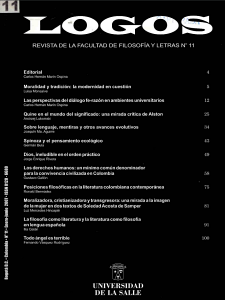Abstract
This exposition is intended for presenting some conceptual implications -and of curricular order- that the faith-reason discussion could have for the college teaching in confessional and non confessional institutions. To achieve so this text relies on the positions presented by Habermas and the Cardinal J, Ratzinger in a debate occurred two years ago. These are the main points of discussion: 1. In the first part of the exposition is made a presentation of the Habermas characterization of post secular societies and the way those societies are driven to articulate several visions of the world; visions nor always nor necessarily opposite among them, but different. His analysis is oriented to show the necessity of making such positions flexible in those of its components that do not affect the essence of the truth of each one. 2. In the second part is the turn for the presentation of the point of view of the Cardinal Ratzinger who points out to the philosophical rationalistic positions the necessity for them of a self application of the very filters of the critic of reason and that they should identify the inconclusive, partial and insufficient elements that have caused that such rationalistic positions cast out of their analysis inherent elements of human being, elements that can not be left aside by the discretion of the judgement of reason. 3. Finally are sketched some conclusions, as recommendations, for the college teaching. These conclusions are specifically related to the focus used in the teaching of subjects of Christian formation, obligatory in the confessional universities.Downloads
Download data is not yet available.



